


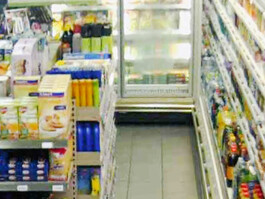
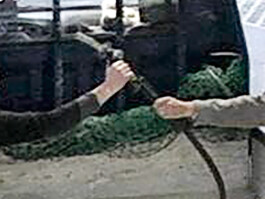
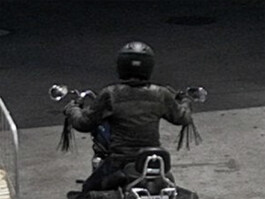
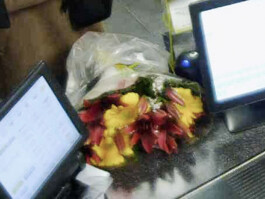
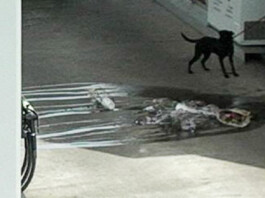
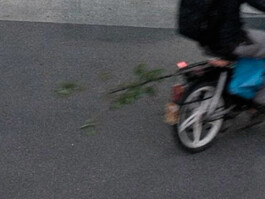
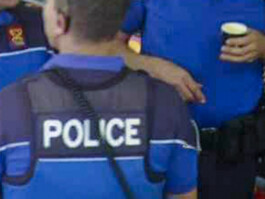
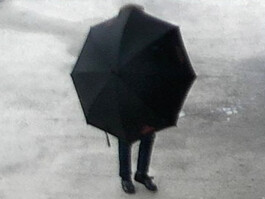
"7 Days" is the result of the observation of a neighborhood gas station, located on the outskirts of a Swiss city whose agglomeration includes more than 400 000 inhabitants. Symbol of a once radiant oil utopia, this place, which could be described as a "non-place" – after the words of anthropologist and writer Marc Augé – originally existed only to provide fuel to power our vehicles. Over time and following the evolution of our society, the identity and vocations of gas stations have shifted and expanded to become purveyors of fast consumer goods and, by virtue of their functions, gather a heterogeneous multitude of individuals. In this commonplace, there are no longer distinctions in terms of gender, origin, or social class. All the different strata of society are brought together. The old and the young, the wealthy and the destitute, men and women – the list is inexhaustible. In a way, gas stations are privileged observation posts, samples of the contemporary human community and its behaviors. An employee in this particular stopping-off-place for over three years, I was able to immerse myself in its atmosphere, to relate it from an internal and subjective point of view. In this place, I saw a laboratory where the days follow one another through an inextricable cycle; they imitate and resemble one another, dependent on this generic and sanitized environment. The hours break up into individual scenes, each with their own protagonists and variables, in the manner of an absurd theatre, refuge of all possibilities, open to countless interpretations. The pungent smell of spilling fuel and the humming of engines, the constant buzzing of overloaded refrigerators and the metallic clatter of coins; behind the counter, a universe takes shape. These various skits combine to depict an intriguing world, a modern and human play, where the carefree stands alongside the pathetic and the banal every day become a hypothetical and singular story.
Swiss born Léonard Rossi was formed at the Vevey School of Photography (CEPV )from which he graduated in 2019. He currently lives and works in Lausanne, where he is pursuing his personal practice. Amateur of documentary and conceptual photography, his approach revolves around social and environmental issues, as well as around the narrative potential of the image. The project "7 Days", presented at the 25th vfg Young Talents Award, focuses with an internal gaze on a social thematic through a particular narrative that derives from enigmatic images.
leonardrossi.ch
@_leonardrossi_
La série de Léonard Rossi, "7 days", est composée de paramètres bien spécifiques: un lieu, une station essence; une durée, 7 jours; des personnages, un motard, un chien, des agents de police, un bouquet de fleur, un homme caché par un parapluie noir, des mains en action, une mobylette en marche. Les éléments de l'histoire sont donnés, l'intrigue, elle, est à composer. Et l'on peut s'amuser avec cette histoire, la réécrire, encore et encore. Le jury salue la tension dramatique créé par la série mais regrette un décalage entre le texte fourni par l'artiste et le travail lui-même; l'intérêt du travail n'étant, de leur avis, pas tant dans la description de la station essence comme lieu d'observation anthropologique mais bien dans le fort potentiel narratif créé par la sélection d'images.








"7 Days" is the result of the observation of a neighborhood gas station, located on the outskirts of a Swiss city whose agglomeration includes more than 400 000 inhabitants. Symbol of a once radiant oil utopia, this place, which could be described as a "non-place" – after the words of anthropologist and writer Marc Augé – originally existed only to provide fuel to power our vehicles. Over time and following the evolution of our society, the identity and vocations of gas stations have shifted and expanded to become purveyors of fast consumer goods and, by virtue of their functions, gather a heterogeneous multitude of individuals. In this commonplace, there are no longer distinctions in terms of gender, origin, or social class. All the different strata of society are brought together. The old and the young, the wealthy and the destitute, men and women – the list is inexhaustible. In a way, gas stations are privileged observation posts, samples of the contemporary human community and its behaviors. An employee in this particular stopping-off-place for over three years, I was able to immerse myself in its atmosphere, to relate it from an internal and subjective point of view. In this place, I saw a laboratory where the days follow one another through an inextricable cycle; they imitate and resemble one another, dependent on this generic and sanitized environment. The hours break up into individual scenes, each with their own protagonists and variables, in the manner of an absurd theatre, refuge of all possibilities, open to countless interpretations. The pungent smell of spilling fuel and the humming of engines, the constant buzzing of overloaded refrigerators and the metallic clatter of coins; behind the counter, a universe takes shape. These various skits combine to depict an intriguing world, a modern and human play, where the carefree stands alongside the pathetic and the banal every day become a hypothetical and singular story.
Swiss born Léonard Rossi was formed at the Vevey School of Photography (CEPV )from which he graduated in 2019. He currently lives and works in Lausanne, where he is pursuing his personal practice. Amateur of documentary and conceptual photography, his approach revolves around social and environmental issues, as well as around the narrative potential of the image. The project "7 Days", presented at the 25th vfg Young Talents Award, focuses with an internal gaze on a social thematic through a particular narrative that derives from enigmatic images.
leonardrossi.ch
@_leonardrossi_
La série de Léonard Rossi, "7 days", est composée de paramètres bien spécifiques: un lieu, une station essence; une durée, 7 jours; des personnages, un motard, un chien, des agents de police, un bouquet de fleur, un homme caché par un parapluie noir, des mains en action, une mobylette en marche. Les éléments de l'histoire sont donnés, l'intrigue, elle, est à composer. Et l'on peut s'amuser avec cette histoire, la réécrire, encore et encore. Le jury salue la tension dramatique créé par la série mais regrette un décalage entre le texte fourni par l'artiste et le travail lui-même; l'intérêt du travail n'étant, de leur avis, pas tant dans la description de la station essence comme lieu d'observation anthropologique mais bien dans le fort potentiel narratif créé par la sélection d'images.